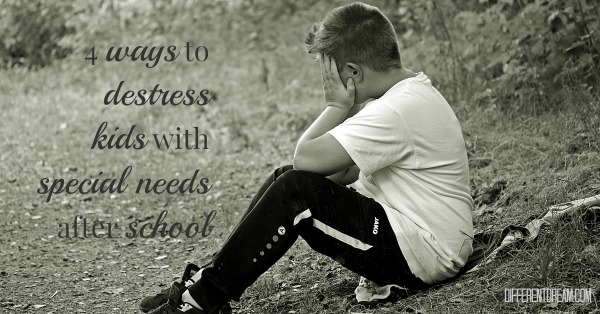4 After School Tips to Lower Stress in Kids with Special Needs

With expectations at school revving up, finding ways to lower stress in kids with special needs can make a huge difference in their lives. Child psychologist, mom, and guest blogger Liz Matheis is here with 4 ideas for parents and kids.
4 After School Tips to Lower Stress in Kids with Special Needs
The end of the school day is a very difficult time for an anxious or traumatized child. It and other transition times like the end of the school year, the beginning of summer, and the return to the school year are all difficult and highly anxiety-provoking.
Once the school year begins, the end of the school day signifies being able to let go. You might think this would be a time to relax. But for many parents and children, it is a time of extreme agitation, meltdowns, and loud volume. This is a very painful time, both physically and emotionally. Parents anticipate the meltdowns and become anxious themselves. Many parents don’t know how to handle this time of the day and end up trying to give their child treats, surprises, and other ways to create distraction and keep him happy. By now, you’ve realized that this doesn’t work. So let’s discuss a few strategies to help you lower stress in kids with special needs.
Tip #1: Take it Home
Many parents feel that it is to their children’s benefit to stay on the playground and get the energy out that they haven’t had a chance to use. Although this sounds great in theory, the truth is, playing on the playground is even more dysregulating and overstimulating for our anxious children. Your best bet is to take them home and let the decompression time begin to lower stress in kids with special needs.
Tip #2: Keep it Quiet
Many parents feel that at the end of the day, they want to know about their children’s day. However, those questions can be overwhelming to kids whose heads are filled with information, demands, commands, and rules to follow. It will serve you well to not start conversation and hold off on the questions.
Tip #3: Create a Quiet Corner
When you finally arrive at home, create a quiet corner for kids. Furnish it with dimmed lighting, a comfortable chair or bean bag, a weighted blanket, soft music or no music, and quiet activities to work on such as coloring or reading. This is a place where children can get the noise out of their heads and decompress. Liken it to your ride home from work, or relaxing on the couch after a long day at work.
Tip #4: Fill ‘er Up
Often times, children are very hungry at the end of the school day. This further negatively impacts emotions and behavior. Children don’t always recognize that hunger can lead to strong feelings of anger, agitation, and anxiety. When kids comes home, provide them with a protein-filled snack to stabilize blood sugar and mood. For younger children, Pediasure might be the quickest way to achieve this goal, especially for picky eaters who likely won’t tolerate fruits, veggies or nut butters.
It’s hard to manage children with anxiety or trauma on a daily basis. So give yourself and your child a break by using these after school tips to lower stress in kids with special needs. Save bonding time for once children have decompressed and are better regulated. Although that may mean less time finding out about their school day, your overall house will be calmer and less stressful for all of you.
How Do You Lower Stress in Kids with Special Needs and Anxiety?
Do you have other tips you use to lower stress in kids with special needs and anxiety? Share them in the comment box!
Do you like what you see at DifferentDream.com? You can receive more great content by subscribing to the quarterly Different Dream newsletter and signing up for the daily RSS feed delivered to your email inbox. You can sign up for the first in the pop up box and the second at the bottom of this page.

By Liz Matheis
Dr. Liz Matheis is a clinical psychologist and school psychologist in Parsippany, NJ. She offers support, assessments, and advocacy for children who are managing Autism Spectrum Disorders, ADHD, learning disabilities, and behavioral difficulties, as well as their families. She is also a contributor to several popular magazines. Visit www.psychedconsult.com for more information.
2 Comments
Submit a Comment
Subscribe for Updates from Jolene
Related Posts
Trauma vs. Trust
For special needs parents, figuring out trauma vs. trust becomes the difference between enduring life and enjoying it.
Flying Near the Sun as a Special Needs Parent
Guest blogger Lisa Pelissier explains how she copes when she is flying near the sun as a special needs parent.
How Can I Make You Feel Safe?
Whether your loved one suffers from trauma or dementia, the best question a caregiver can ask is, “How can I make you feel safe?”






Cindy, you are so right. Consistency is important to all kids. It provides the structure, consistency, and limits they need to function well. For kids on the autism spectrum, this consistency is doubly important. Thanks for sharing your insight. Jolene
For both my Asperger’s kid and my other two kids, I have to make sure that snacks are available after school. And I try to keep it consistent every day… they always know to expect going to the dining table and doing homework and eating snacks. I think they feel relieved to know what is coming and it will be quiet at the table (except for each other talking about their homework or day). Then after homework they can play in their rooms, outside, or watch SuperWhy (from Monday to Thursday) or play reading games on Kindles. I think the consistency is keep for my kids.